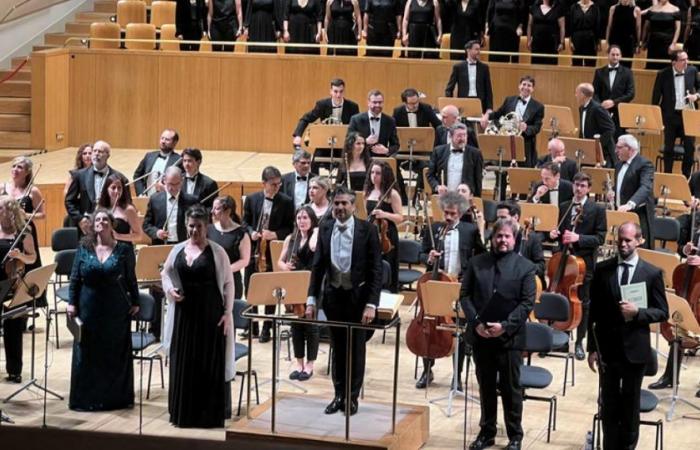The popular glow of his “Ninth Symphony”with its enthusiastic final song to the universal brotherhood that has so inspired some minor bards (Miguel Ríos achieved the greatest success of his rock career by appropriating it in a pocket version, as a complement of moderate lysergic effects, in the Hispanic version, to the ‘ Imagine’ by Lennon), has overshadowed the other great Beethovenian anniversary of this 2024.
A couple of months before the premiere of the “Novena”, that is, also 200 years ago, For the first time, the work that the composer himself considered the most important in his generous catalogue, lavish in masterful contributions, was presented to the public for the first time, especially during those decisive final years in which the genius, freed from any corset, seemed to venture into new paths. expressive elements that went even beyond the romanticism that was beginning to prevail in halls and salons.
Furthermore, as if trying to arouse curiosity about that other recently illuminated score, during the same concert in which the author presented his last symphony to his Viennese followers, he included three of the five parts that make up the “Missa Solemnis”which has never enjoyed the same unanimous and widespread appreciation, perhaps because it is a more complex, hermetic, ineffable score (the Beethovenian Wilhelm Furtwängler always refused to perform it because he did not fully understand it).
The National arrives at the summer musical event in Granada
That is why it has been a success that the ONE, instead of being carried away by fashion, has now chosen the “Missa Solemnis” both to close its magnificent season, last weekend, and to perform this Wednesday at the Granada Festival. Of course, surely his interpretation of this unfading summit of all sacred music will not cause among some the “fainting” that the Vienna Philharmonic has caused in its wake, playing Rimsky-Korsakov’s “Spanish Capricho” or the “Hungarian Dance number one” by Brahms, but the interpretation of Beethoven’s sonorous cathedral will leave more doubts than certainties floating over the clear Granada sky, as corresponds to man’s own fragile and indecipherable nature.
Because anyone who hopes to find in this great work answers to their most intimate and profound concerns, or simply peace for their spirit, will hardly be able to achieve them. Not even a rather epidermal, illustrative, well-reviewed interpretation of these disconcerting pentagrams like the one that has been offered to us in recent days, in Madrid, under the always illuminating direction of David Afkham, will have served to smooth out its irregular profiles, making it closer and more understandable. In some previous note we had already noted, right here, that it had taken the great Riccardo Muti no less than half a century of in-depth study to approach a plausible understanding of its essences, and for that reason only at the end of his period as head of the Symphony of Chicago, a turning point (almost final) in his prolific and distinguished career, he decided to program it for the first and only time.
Afkham is still young, and although he thoroughly masters the technique, he will surely have time to go even deeper into a work that took Beethoven himself almost a lifetime of experiences of all kinds to conceive (he suffered, yes, but not as much as is sometimes he claims), and several years of intermittent dedication to give it its final form. What was the composer really after? Only he and the musicologists who deal with blindfolding in the shadows know that. “Why do such big projects if life is so short?” Horacio asked himself. But Beethoven thought with high lights on the future about his own image in the course of history (“who does not gladly exchange health, rest and life for reputation and glory?” Montaigne asked).
Beethoven also sought to establish himself as a great author in sacred music.
An author who had expanded the channels of the music of his time, pointing out new procedures, other possible paths, could not ignore the relevance of sacred repertoire in the history of Western art: he himself had to be able to say something about it, and what he had done so far, in that sense, did not do justice to his own greatness. So surely, in recent years, he decided to carve out his own place among the Palestrina, Victoria, Bach, Händel Mozart…
Of these five, he had at least thoroughly studied the notable contributions to the genre of all of them except Spanish (although Haydn should also be added). But also, following the dictate of Cicero, for whom “philosophizing is nothing other than preparing for death,” Beethoven perhaps felt the need, seeing that the only appointment that could not be postponed was approaching ever closer to his horizon, to express something of his own harvest on something transcendental like faith.
Only, to be honest, Beethoven’s personal reflections are much more tense, in form and content, than the sweet consolation, the effusiveness that shines in general, the calm that he provides us. Bach’s “Mass in B minor.” The rebellious composer from Bonn challenges the Almighty with unusual strength and vigor, sometimes even with a certain violence: the choir’s resolute appeals, even though they head towards the highest regions in search of peace and mercy, exude unrest. You have to wait until the work is well over to find some kind of consolation, a light that prevails over its ambiguity, like those sublime Beethovenian melodies that partially distance us from anxiety: the sound of the oboe that sneaks into the second movement of the «Seventh», all the lyrical haven of the «Ninth» after the violent Scherzo, the evocative Adagio of the «Emperor»,…
Chaos as the last destiny of man
Here it is the ethereal sound of the violin, which refers to his great sonatas for the instrument (or even the slow movement of his concerto), which seems to restore a certain serenity from its appearance in the «Sanctus». But everything resolves as if in a mirage. In the conclusive “Agnus Dei”, which in principle seems to follow the same conciliatory path that allows us to harbor a certain hope, the echoes of drums and trumpets, precursors of the war. Chaos is always the ultimate destiny of man. And you only have to look at its current circumstances: when military conflicts seemed forever banished from Europe, the invasion of Ukraine once again places us before the possibility of our annihilation as a species, something to which have been added attacks as savage as the perpetrated by Hamas in Israel, with the well-known consequences. “There is no peace for the wicked,” read the title of an interesting Spanish film; but in the middle of the fray the just, good and noble also seem to fall.
There is also no possible response to human pleas, or Beethoven saves it with that abrupt ending, open, disconcerting or discouraging. Jan Swafford assures, in his magnificent essay on this author, that the “Missa Solemnis” concludes this way because the composer had already outlined his continuation, an amendment to the whole. Precisely that “Novena” that points towards man as essential, the authentic architect of his own destiny, in the ideal case that he renounced his selfish pretensions to become brothers with his neighbor, something that surely satisfied him as the free thinker that he was, only at the end of the journey more focused towards an unclassifiable religiosity, but which is also reflected in the center of Christian thought.
An ambitious season finale, full of ideas
In any case, what a relatively memorable, but overall interesting, performance by the «Missa Solemnis», with notable soloists; a choir that gave the best of its abilities (there was tension especially between the women, of course in a work that uncompromisingly pushes them to the very limit!); a magnificent orchestra in all its sections and individual interventions (the concertmaster was superb), and a conductor who, although he did not risk unraveling the deepest secrets of a work with so many edges, exercised maximum control so that the unique building never faltered, served to make us reflect on our humble, complex condition through the thought of a colossus like Beethoven, more than justifies the existence of such solid ensembles, in a great artistic moment, as those of the National Orchestra and Choir. This is how a season ends, with ambition and sowing ideas.






